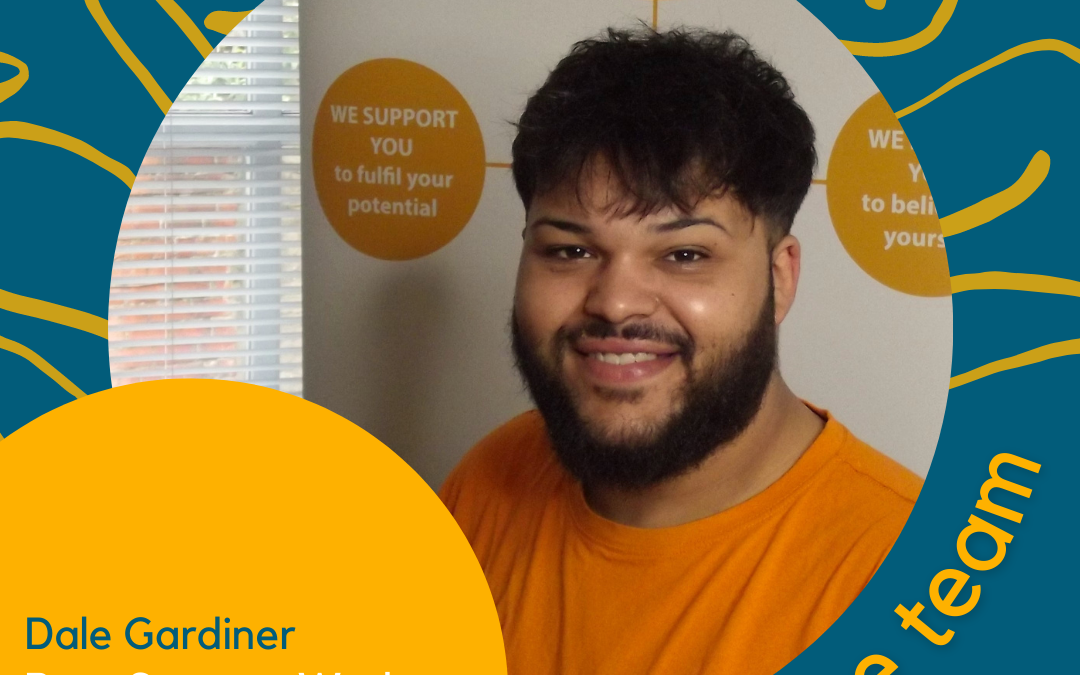Today, during Care Experienced Week, we’re shining a spotlight on Dale Gardiner who works as a Peer Support Worker within Helm’s inaugural housing project, Hame.
Dale, can you tell us about your background?
I went into foster care when I was nine, then came out when I was 16. The next two years were in residential homes and from there I got a tenancy. When I went into foster care, I also had to move high schools. At 16 I moved back to Dundee and it was a tough period as a young person with little support. I fell through the net, didn’t get support and got into debt.
However, from there I did go into employment and I also went to college to do a 12 week employability course about personal development.
I’ve just taken the next step and now I’m employed at Helm as part of the Hame team.
How does your background help in your current role?
It’s given me perspective.
I can empathise with the young people I work with because I can see myself in the exact same position, in what feels like only yesterday. A lot of the lessons I learnt are still very fresh and I’m able to pass them down to the young people at Hame which I think is why my role is so valuable and key.
I have lived the experience and I can now pass that experience and that knowledge down to young people as part of the support we offer.
Also, I think moving schools impacted me positively. It was terrifying not knowing anyone but socially it’s helped me a lot. I can now make new friends, integrate myself and its helped me figure out the type of person I am. I now know that things will work out and I know who I am. It also given me an open outlook on the world.
Can you tell us more about your role and what you do at Hame?
I’m a Peer Support Worker, which means I work with the young people daily, along with the rest of the team. The support is led by the young people. For example, it can be things like doctor’s appointments, college interviews, shopping and budgeting.
As Peer Support Worker, I’m young and I’ve just been through the process of learning things they’re having to learn, which helps me relate to them on a personal level. I’ve been there and done it and I can talk to them about what I’ve learnt and what has benefited me in the past.
We’re currently supporting two young people which means that every day is different but every day involves supporting the young people and being here for them.
I also do a lot of things for them in the background like getting applications ready, preparing support plans and doing risk assessments. We need to make sure that we’re documenting the support we provide and the progress the young people are making.
How do you build strong relationships with the young people you’re supporting?
Relationship building is key for us. They have to like us and trust us to want us to support them.
We found that when we’re working with them on specific tasks, such as building a support plan, it can be a bit overwhelming. We’ve also found that just sitting in the office and completing paperwork can be a bit intense for them. However, if we break up tasks with activities and fun things it’s really helpful. It gives us time with the young people where the only thing we’re doing is bonding and connecting.
It’s about creating a relationship.
Some of the things that we’ve done in the past are going for walks along the beach. Usually we’re doing something physical because it’s good for their mental health and getting fresh air is good for them. We’ve also done things like just sit in a café and chat to them.
The reason we do it is because there’s nothing else that’s taking up the time, we’re not expecting anything from them, we’ve not got any questions they need to answer or any people that we need them to contact. We’re simply spending time with them as a peer, as a support worker, chatting to them about how their week has been.
By doing that, we’re building a bond, we’re caring about them, showing an interest, being patient with them, and doing things that are fun together. That’s how we build strong relationships to help the young people.
What’s the best thing about working at Helm?
There’s a couple of things. I really like coming into the building, seeing all the staff and working with the team.
Most importantly, every day is different and every day we’re working towards changing things for the better for the young people.
Thank you for taking the time to talk to us Dale about your background and your role.
For anyone interested in finding out more about Hame, Helm’s housing project supporting care-experienced young people, please email hello@helmtraining.co.uk and one of the team will get in touch with you directly.

